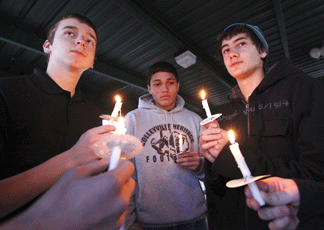By Bethany Peterson/editor-in-chief
TCC’s new police chief stepped into a big job with a single goal last semester.
“Our overall mission is the safety of every person who enters the campuses,” Shaun Williams said as he glanced at the live security footage on his desktop.
Williams got his first law enforcement job at 19 in Virginia. He later graduated from the then-TCJC police academy and went to work for the Arlington Police Department. After a short stop at the Cedar Valley College Police Department, he came to SE Campus as a lieutenant in 2009. In February 2011, he became assistant chief and the chief of police in September.
He plans to keep an open door for his staff and officers, he said.
“I love talking to everyone, ‘What’s going on on your campus?’” Williams said. “If there is a death in the family [of an officer] or an illness, we keep that up to date and keep the family atmosphere.”
I should be able to take an officer from NW, and he will know what to do,” he said.
The current policy and procedures are in need of rewriting, though.
“The ones we currently have, they are probably 10 or 15 years old without revision,” said NW Sgt. Terry Richards, who is tasked with bringing the policies up to date.
There are two types of policies, he said.
“You have general orders, which is the way we prefer you do them,” Richards said.
These include use of force and methods of pursuit. Officers are allowed to use their judgment when these situations arise.
Then, there are standard operating procedures.
“That’s more like a step-by-step procedure,” Richards said, and includes how to wear the uniform, install a radio or clean a gun.
No policies are totally new, he said, but existing policies have to be consistent with current court rulings and state and federal laws.
“Things in this business are always changing,” he said. “We have to make sure our rules and regulations and how we want our officers to respond is up to date.”
Once the new policies are written, all officers will be given a course on the new policy, Richards said.
That is not the end of Richards’ task, though.
“It’s a dance every day,” Richards said. “If I see something on the news, I have to research, anticipate court cases and their effects.”
The rewrites will also move the department closer to being accredited by the Commission on Accreditation for Law Enforcement Agencies.
“We are recognized as a police agency,” said Dwane Kelley, the police department training coordinator. “We meet the minimum standards.”
Accreditation means a department has reached the gold standard in public safety.
“Trying to get CALEA-accredited is like a student working to get a Ph.D.,” Kelley said.
Accreditation gives the agency a higher professional status.
“Being accredited helps the reputation of the agency,” Williams said.
One part of accreditation is keeping all officers in compliance with state laws, including ongoing training. To keep their certification, officers must complete 40 hours of training every two years. TCC hired Kelley to help with this process.
“What I’m brought in to do is make sure each officer meets those requirements so an officer is never in jeopardy of losing his license,” Kelley said.
Some classes are required for all officers, like classes on new laws and regulations. Once officers leave the basic training stage, they are also required to take Spanish for law enforcement.
“I’ll find areas that are offering courses and tell the campus lieutenants,” Kelley said. “The lieutenants tell me when they have people signed up.”
Williams has a department requirement for his lieutenants.
“All lieutenants go through a senior management course,” he said. “For me, the level of lieutenant is a level of command. They are in charge of their own city.”
The courses make the lieutenants stronger leaders which make for happier officers and safer campuses, Williams said. Training allows others to prepare for career advancement.
“Career building is something we are trying to do as well,” he said. “If there is an opening, I should be able to look at this department. Everyone should be able to do every job.”
But for all the training and work, Williams said there is a more important part. Officers’ presence on campus plays a role in preventing crimes.
“If a person is thinking about burglarizing a car, and they hear ‘If you go to TCC, all you see are police cars,’ that is us doing our job,” he said.
Police officers park their patrol cars at strategic places around campus to watch traffic, pedestrians and parked cars, Williams said.
The police will soon have another tool to protect students: Code Blue phones. The emergency stations include a speaker and a video camera so emergency personnel can see the situation and tell the caller how to best respond.
The Code Blue phones will be handled by the same department that answers emergency calls to the TCC emergency number, 817-515-8911.
“We will have someone there just monitoring cameras all the time,” Williams said.
Dispatchers would be trained to respond to emergency calls and Code Blue phones.
Williams encouraged those on TCC property to remember to call the TCC emergency number instead of dialing 911. Any 911 calls have to be redirected by local police to TCC.
“It takes longer. We lose valuable time,” Williams said.
TCC works with city police departments where campuses are located, Williams said. Besides those arrested for outstanding warrants, TCC officers can arrest those who break the law on TCC property and house them in a city’s jail while TCC police conduct the investigation.
“We have mutual agreements with all the cities. We can call and have their officers come on campus and assist,” Williams said.
However, preventing crimes is the department’s main goal Williams said.
“We are boring in a very good way,” he said.
But he also expects his officers and personnel to behave in a professional manner at all times, he said.
“Respect everybody. I won’t accept less than the utmost respect,” Williams said.
As police chief, Williams coordinates one police department with multiple sections. There are 84 full-time police officers, five part-time officers and 20 security personnel in the district.
The difference is that officers are sworn in and can carry weapons while security personnel are unarmed, Williams said. Security personnel provide an official presence in areas where people congregate and help police with crowd control.
Beyond the guns and handcuffs, the police department provides a variety of services: opening buildings and rooms, assisting motorists with jumps or keys locked in and providing escorts to vehicles.
Though the department is spread out across the district, the police on each campus follow the same procedures. This increases efficiency within the department, Williams said.
“If an emergency happens on South,























